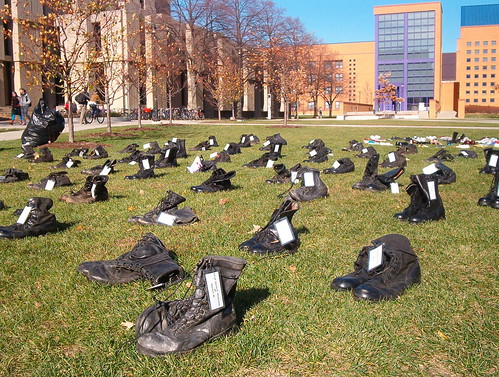
The exhibit also emphasized that the Cost of War has reached more than $220 billion dollars (with no end in sight). The National Priorities Project emphasizes that the money spent on the conflict could have been used to fund any one of the following:
full health insurance for 132 million children
nearly 4 million public school teachers hired
nearly 11 million four-year college scholarships
nearly 2 million housing units
9 years of fully-funded global anti-hunger programs
22 years of fully-funded global AIDS programs
basic immunizations for every child in the world for the next 73 years.
For me, the exhibit was a good reminder that war = death. It's always non-sensical to try to account for the statistics of death. Does a number like 30,000 mean more to us if it were described as 10 World Trade Center-sized scoopfuls of humanity? Would a number like 79 mean more to us if it were 79 little brothers, first cousins, husbands or daughters? During the major phase of combat operations, the major news networks were reluctant to speculate on how many Iraqi civilians were killed by American forces. This was war, after all. People die in wars.
I'm a strong opponent of this war, but I wouldn't exactly call myself a pacifist. I suppose that violence is necessary in certain situations. But behind the video-game media reports, the pundits debating the reasons for war, the important men making speeches, I think the pacifists understand better than most of us this key fact: war means death for the "deserving" and the "undeserving" alike (whatever those terms mean). I wish I knew better what to do with this knowledge.
No comments:
Post a Comment